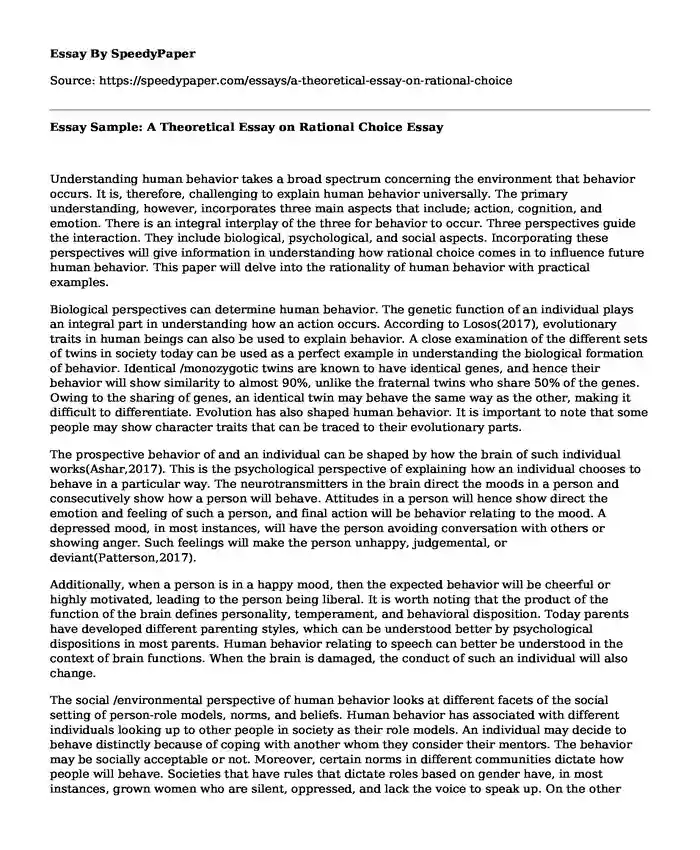
| Type of paper: | Essay |
| Categories: | Intelligence Human behavior Public relations Emotional intelligence |
| Pages: | 3 |
| Wordcount: | 653 words |
Understanding human behavior takes a broad spectrum concerning the environment that behavior occurs. It is, therefore, challenging to explain human behavior universally. The primary understanding, however, incorporates three main aspects that include; action, cognition, and emotion. There is an integral interplay of the three for behavior to occur. Three perspectives guide the interaction. They include biological, psychological, and social aspects. Incorporating these perspectives will give information in understanding how rational choice comes in to influence future human behavior. This paper will delve into the rationality of human behavior with practical examples.
Biological perspectives can determine human behavior. The genetic function of an individual plays an integral part in understanding how an action occurs. According to Losos(2017), evolutionary traits in human beings can also be used to explain behavior. A close examination of the different sets of twins in society today can be used as a perfect example in understanding the biological formation of behavior. Identical /monozygotic twins are known to have identical genes, and hence their behavior will show similarity to almost 90%, unlike the fraternal twins who share 50% of the genes. Owing to the sharing of genes, an identical twin may behave the same way as the other, making it difficult to differentiate. Evolution has also shaped human behavior. It is important to note that some people may show character traits that can be traced to their evolutionary parts.
The prospective behavior of and an individual can be shaped by how the brain of such individual works(Ashar,2017). This is the psychological perspective of explaining how an individual chooses to behave in a particular way. The neurotransmitters in the brain direct the moods in a person and consecutively show how a person will behave. Attitudes in a person will hence show direct the emotion and feeling of such a person, and final action will be behavior relating to the mood. A depressed mood, in most instances, will have the person avoiding conversation with others or showing anger. Such feelings will make the person unhappy, judgemental, or deviant(Patterson,2017).
Additionally, when a person is in a happy mood, then the expected behavior will be cheerful or highly motivated, leading to the person being liberal. It is worth noting that the product of the function of the brain defines personality, temperament, and behavioral disposition. Today parents have developed different parenting styles, which can be understood better by psychological dispositions in most parents. Human behavior relating to speech can better be understood in the context of brain functions. When the brain is damaged, the conduct of such an individual will also change.
The social /environmental perspective of human behavior looks at different facets of the social setting of person-role models, norms, and beliefs. Human behavior has associated with different individuals looking up to other people in society as their role models. An individual may decide to behave distinctly because of coping with another whom they consider their mentors. The behavior may be socially acceptable or not. Moreover, certain norms in different communities dictate how people will behave. Societies that have rules that dictate roles based on gender have, in most instances, grown women who are silent, oppressed, and lack the voice to speak up. On the other hand, there is more liberalism and egalitarianism to limitless norms and beliefs in other societies. As a result of the different norms and expectations in different communities, it is easier to determine human behavior based on the available norms.
Conclusively, the three main perspectives are useful in understanding human behavior and the determinants of behavior. Human behavior must be rationally analyzed based on these perspectives to help intervene further.
References
l 1033 Ashar, Y. K. (2017). Brain mechanisms of the placebo effect: an affective appraisal account. Annual review of clinical psychology, 13, 73-98.
Losos, J. B. (2017). The Princeton Guide to Evolution. New Jersey: Princeton University Press.
Patterson, G. R. (2017). A developmental perspective on antisocial behavior. In Developmental and life-course criminological theories, 1(1), 29-35.
Cite this page
Essay Sample: A Theoretical Essay on Rational Choice. (2023, Apr 11). Retrieved from https://speedypaper.com/essays/a-theoretical-essay-on-rational-choice
Request Removal
If you are the original author of this essay and no longer wish to have it published on the SpeedyPaper website, please click below to request its removal:
- Social Responsibility Essay Samples
- Counter-Culture: Selling Than Rebelling? Free Essay
- Essay Example of Walt Whitman
- The Iliad Essay Example
- Sundiata: Women's Essential Role in Achieving Peace and Prosperity
- Paper Example. History of Japan and the Cold War
- Paper Example: Issues Faced by American Muslim Women
Popular categories




